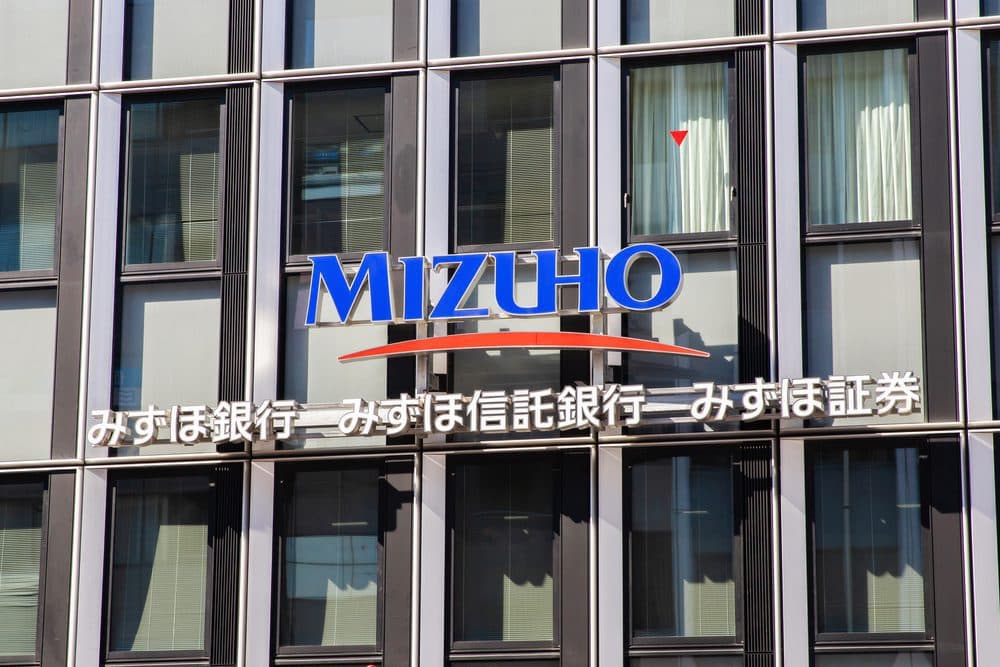Analysts: Digital Wallets Poised to Disrupt Traditional Banks Over Next Decade
Mizuho Securities equity analyst says buying Square could be like buying JP Morgan in 1871

A Mizhou financial group office in Japan. Source: Shutterstock
- Cash App could increase its average revenue per user by five times in the coming years, according to research by Mizuho Securities
- Square’s bitcoin trading capabilities are among its most important services in terms of driving engagement, and in turn, revenue, Rosenblatt Securities analyst says
Digital payments companies such as Square are in a position to steal major market share from traditional banks over the next decade, analysts said, as crypto services are driving engagement for such businesses.
Cash App, a service developed by Square, could become the “money center bank of the future,” according to research by Mizuho Securities.
“This could make buying [Square] analogous to buying JP Morgan in 1871,” Senior Analyst Dan Dolev wrote in a July 15 note.
Twitter CEO Jack Dorsey, who has long been a proponent of cryptocurrencies, co-founded Square in 2009 and serves as its chairman and CEO.
Mizuho’s bullish outlook for Square comes after the digital payment business announced in February that it had purchased 3,318 bitcoins at an aggregate purchase price of roughly $170 million. The buy raised the company’s held bitcoin to five percent of Square’s total cash, cash equivalents, and marketable securities as of the end of 2020.
More recently, Jesse Dorogusker, the hardware and TIDAL lead at Square, tweeted last week that the company has decided to build a hardware wallet service to make bitcoin custody more accessible.
Dolev called Cash App “the ultimate challenger bank,” noting that Mizuho’s analysis of the business indicates a path to an average revenue per user of between $150 and 200 in the coming years, which is between three and five times above current levels. The average revenue per user ranges from $400 to $700 at consumer banks like JPMorgan and Wells Fargo, he added.
Still, Sean Horgan, an equity research analyst at Rosenblatt Securities, told Blockworks that he believes digital wallets as a group are going to disrupt traditional incumbent consumer banks over the next five to 10 years.
The customer acquisition costs for companies like Cash App and Venmo may range from $5 to $100, he added, as they are helped by the “network effect” of millennials helping older adults adopt the services. This is compared to incumbent banks who may spend $1,000 to gain a new customer, Horgan noted, as they may entice prospective credit card users with free rewards and build out costly bank branches around the country.
“Traditional banks [have] about $1 trillion of market value,” he said, “and as they steal revenue share and user share, that market cap is also going to transfer from the traditional banks to the challenger banks.”
Crypto services driving engagement, revenue
Square was a pioneer of gathering users through a free peer-to-peer offering and then rolling out additional products over time, Horgan said. The company’s bitcoin trading capabilities, which were added in 2018, are among the most important services in terms of attracting users to use the platform each day, he argued.
Cash App allows users to buy and sell bitcoin straight from their Cash App balance. Unlike other apps, most of the buying and selling happens in seconds, according to the company’s website, and users can spend their proceeds from a free Visa debit card.
“Bitcoin drives engagement and engagement drives monetization,” Horgan explained. “The more funds you’re bringing onto Cash App, the more you’re considering this thing your primary bank account or primary spending account, the more likely you are to take a debit card or credit card offering out and start using that.”
Venmo followed Square’s footsteps when the company announced in April that it would allow customers to buy, hold and sell cryptocurrency directly within the Venmo app.
British fintech firm Revolut revealed this week that it had raised $800 million in a new funding round led by SoftBank and Tiger Global, which values the company at $33 billion. People can use Revolut’s app to buy, sell, receive or spend cryptocurrency, as well as send crypto to other US Revolut accounts.
Moving forward, Horgan said he expects crypto rewards to gain more popularity.
Square offers a service called Bitcoin Boost, in which a user can select to have bitcoin automatically placed into their account upon each cash card purchase. Similarly, BlockFi earlier this month launched its Visa rewards credit card for a handful of its US-based clients, providing users with crypto returns when they use the card.
“I’d rather get 2% back in bitcoin than 2% back in a 2% depreciating asset per year, which is cash,” Horgan said. “We’re going to see a lot more of that, and that’s just another reason to use these digital wallets like Cash App rather than traditional banks.”






